Weighing up a particular energy technology’s advantages and disadvantages is a critical part of determining its worth — the impact of earth energy systems is no exception. Carefully considering the pros and cons of a geothermal heat pump is an insightful way to make knowledgeable decisions for your home!
You may have come across the terms “ground-source heat pump,” “earth energy system,” or perhaps “ground-source system.” People often use these terms interchangeably when referring to geothermal heat pumps.
In short, these terms all refer to systems that use ground heat to work.
Understanding the advantages or disadvantages of ground-source systems will help you make decisions best suited to your needs in a well-balanced way.
Follow us as we explore the pros and cons of a geothermal heat pump system in this article.
Table of Contents
7 Geothermal Heat Pump Pros

Source: Residence Style
1. Energy Efficiency
Energy efficiency is defined as reduced energy waste. Think of it like this — you’re meeting the same energy demands, just more efficiently.
Using the vast storage ability found in-ground resources, geothermal heat pumps can provide efficient energy.
According to this study — if you were to use geothermal heat pumps instead of conventional electricity to pre-heat a structure, you’d cut your energy by more than half (this applies to those of you living in the U.S).
For those of you living in Europe, you’ll be pleased to know that ground source energy has proven to be 30-50% more energy efficient.
Talk about great savings!
2. Heating and Cooling Capabilities
Here’s some excellent news — ground source heat pumps can offer you both a cozy house in winter and cool temperatures in summer!
Earth energy can exchange heat through the ground, water, and air. Basically, geothermal heat pumps are ideal for both floor heating and air-conditioning systems.
What’s more, you can apply these systems to households, office spaces, larger buildings, and even industrial operations. But it doesn’t stop there; you can also integrate this method into chemical, agricultural and high-pressure systems.
3. Lower Operating and Maintenance Costs
Low operational and maintenance costs are among the most notable pros of geothermal heat pumps!
Let’s use Switzerland as an example — this country has had rapid market growth in geothermal heat pump energy over the last few years. One of the main reasons for this is due to low operating costs.
Even though setting your system up might cost more (at least initially), this renewable energy is most certainly worth it.
4. Low Visual Pollution
If you’re going to weigh up the pros and cons of a geothermal heat pump, you simply cannot overlook this factor — low visual pollution is a significant addition to the pro’s column.
Unlike other renewable and non-renewable energy resource structures, geothermal heat pumps are not visually disruptive. Take a second — have you ever seen a large solar panel array or a wind turbine for that matter? They can be quite an eye-sore.
In the case of a geothermal heat pump, most of the structure is underground, and the above-ground infrastructure is generally well-hidden within a building.
Major brownie points for geothermal energy!
5. No Operational Noise Pollution
Another notable advantage of ground source heat pumps is that they give off very little (if any) noise pollution while operating.
The ground/earth is capable of effectively absorbing sound waves. What’s more, you’ll find that the pumps are housed inside buildings.
Unlike the droning sound of a generator or the whirring of a wind blade, earth systems are more inclined to provide you with all of the energy, without the noise.
“Ah, the sound of silence.”
6. Cost Saving Technology
The long life span of equipment used in ground source heat pumps can last for over fifty years.
Yes, you read that correctly. We’re talking about equipment lasting around half a century!
Radiating sustainability (and heat!), this technology is a great greener alternative compared to conventional systems.
7. Resilient to Weather Events
A major pro of a geothermal ground pump is that the technology is quite resilient to weather events! We specifically refer to storms, cold fronts, heat waves, and general daily weather fluctuations.
According to research, resilient cooling can be achieved when a combination of strategies is used to lay down the pumping equipment
7 Geothermal Heat Pump Cons
1. Location Geological Suitability
It’s crucial to investigate the downsides of geothermal energy, especially regarding suitability.
Although ground-source heat pumps are pretty resilient to weather events, seasonal changes and geology may play a significant role in this technology’s suitability for your home.
For example, an area with dry soils may be problematic for infrastructure durability in the long run. Moreover, strain can be put on this system when placed in extreme weather conditions (think, ice).
2. High Initial Installation Costs
If you’re looking to install a ground source heat pump, you need to be aware of the installation costs.
Well, it comes down to the equipment being costly.
We understand that this may be off-putting. However, if you’re after sustainable, safe, quality equipment, then it’s certainly a necessity!
3. Tricky To Install In Older Existing Homes
A ground source heat pump is a viable option for both older and newer structures. However, it can be tricky to implement it in more established developments.
The issue here is that older houses weren’t necessarily designed with renewable energy systems in mind. In fact, research shows that homes were often designed to accommodate oil heat technologies.
As such, it isn’t easy to restructure oil heating systems (and the accompanying insulation) to accommodate ground-source heat pumps.
4. Dependence On Electricity
Heat energy from the ground needs to find its way up and out. As such, a pumping system is almost always necessary.
Essentially, these pumps need to run off of energy sources themselves, so if you do want one, you’ll need to use some electricity to keep them running.
Thankfully the energy generated from heat pumps uses less electricity than other, more conventional methods. Nevertheless, it’s a disadvantage of the technology.
5. Ground Disturbance During Installation
An inconvenience associated with ground-source heat pumps is the necessary ground disturbance. Before and during installation, geothermal heat pumps require land excavation.
The good news is that the ground is reused for coverage, but a disadvantage is that the technology will need to disrupt the landscape first!

Source: AR Brouwer
6. Better Alternatives For Cooling
When we look at the set-up of ground source heat pumps vs. air source heat pumps (in the context of cooling, of course), it may not be easily affordable.
What do we mean by this?
Suitable equipment for ground source heat pumps that cool is often more expensive than air-conditioning systems. Moreover, it’s unclear why geothermal heat pumps are an economic investment compared to air source heat pumps.
In short, it can be much more costly to cool with ground source heat pumps.
7. Environmentally Risky Circulating Fluids
The design of heat pump technologies includes the flow and circulation of certain chemical fluids.
Anti-freeze fluids are a great example. Circulating anti-freeze fluids can include chemicals such as potassium acetate, ethanol mixtures, methanol, urea, propylene glycol, and calcium magnesium acetate.
Unfortunately, if these chemicals leak, they can cause toxic soil and groundwater pollution levels, corrosion of equipment, and health hazards for both humans and animals.
A pretty scary part of the set-up!
Are Geothermal Heat Pumps Worth It?
Figuring out if a geothermal heat pump is worth having is not an easy decision to make. There are various aspects to consider. These can include:
- Costs relating to the ground energy system (can you afford the high initial costs?)
- The suitability of your house’s structural design (if there is existing infrastructure and how old it is)
- The pollution risk level (ground geologies and quality of your equipment installation)
- The environment you wish to install in (the seasonal variations)
What stands out are the advantages of earth energy compared to conventional energy sources (such as fossil fuels).
With long-lasting technology and lower environmental impacts, ground source heat pumps are greener and more sustainable.
However, don’t just be swayed by the advantages — always be mindful of the downsides.
Final Thoughts
The pros and cons of a geothermal heat pump are well-defined and can be overwhelming to analyze.
But at the end of the day, this technology is certainly more environmentally friendly than conventional energy sources.
There are pros and cons to any energy technology, but the additional advantages of a ground source heat pump make it an appealing and worthwhile green technology to consider!
Click on these links to learn about the advantages and disadvantages of geothermal energy!

